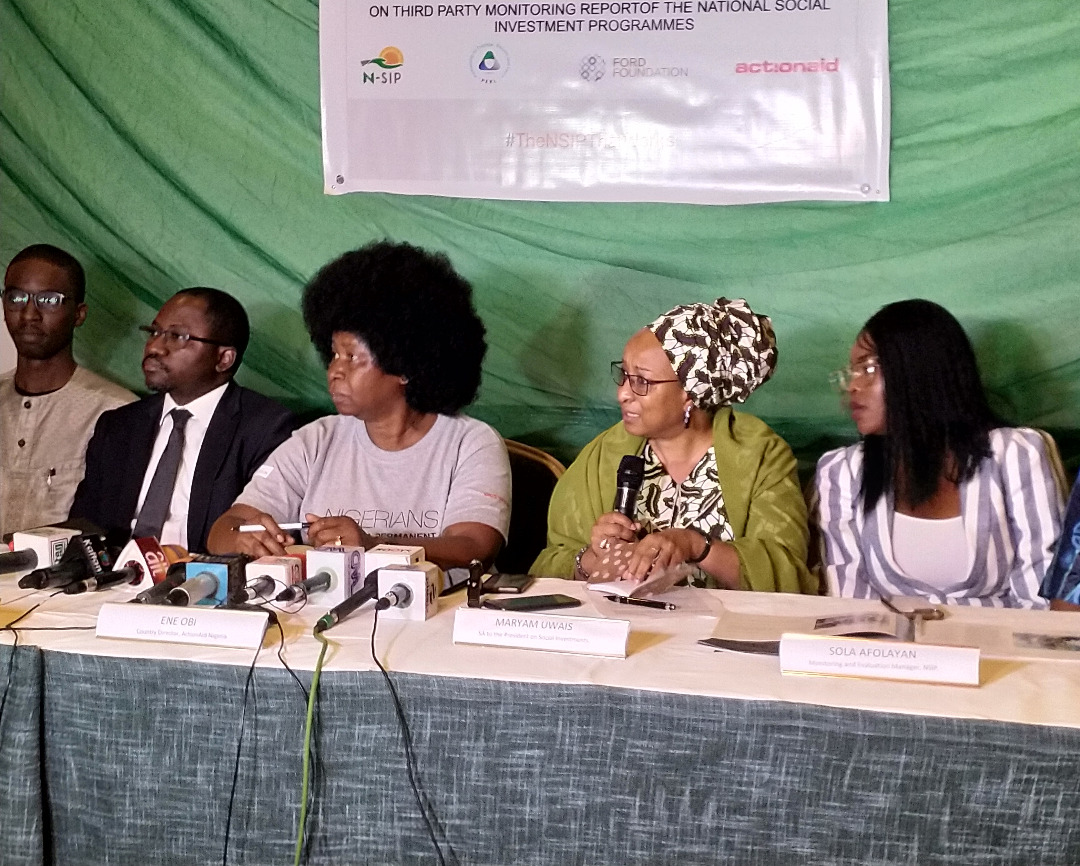ActionAid wants extension of feeding program to all primary school pupils
The ActionAid Nigeria (AAN) has urged the Federal Government to extend the Home Grown School Feeding Programme (HGSFP) to all pupils of primary schools across the country. The AAN Country Director, Mrs Ene Obi, made the appeal on Wednesday in Abuja at the launch and dissemination of the Third Party Monitoring Report of the National […]

R-L: National Social Investment Programmes (NSIP) Monitoring Manager, Mrs. Sola Afolayan; Senior Special Adviser (SSA) to the President on Social Investment Programme, Mrs Maryam Uwais; ActionAid Nigeria (AAN) Country Director, Mrs Ene Obi and others during the Launch and Dissemination of the Third Party Monitoring Report of the National Social Investment Programmes (NSIP) Wednesday in Abuja.
The ActionAid Nigeria (AAN) has urged the Federal Government to extend the Home Grown School Feeding Programme (HGSFP) to all pupils of primary schools across the country.
The AAN Country Director, Mrs Ene Obi, made the appeal on Wednesday in Abuja at the launch and dissemination of the Third Party Monitoring Report of the National Social Investment Programmes (NSIP) and Engaging Citizen’s Participation in the Social Investment Programmes (EnCE-SIP) Project Dissemination.
She said the extension should include pre-primary classes and classes 4 to 6.
According to her, the AAN in partnership with the National Social Investment Office (NSIO), DFID- Partnership to Engage, Reform and Learn (PERL) and the Ford Foundation worked on the third-party Monitoring on the implementation of the NSIP.
She said that the Federal Government should also introduce additional incentives into the programme like notebooks, school bags and stationery apart from providing meals for the school children.
She said that since the home grown school feeding programmes had increased enrollment, there was the need to provide more infrastructural development that comes with the constraints of the enrollment and that the government should liaise with relevant ministries for the construction of additional classrooms.
“The social investment Programme of the government has so far created a ripple effect towards the educational, agricultural and the health sectors of Nigeria. There was reported increase in the learning reception by school children as well as enrollment in schools because the home grown school feeding programme gives the students access to have one meal a day.
“Parents of these children also form part of the secondary beneficiaries under the programme as well as livelihood that has been created for cooks and food vendors,” Obi said.
She said despite the positive outcomes the NSIP had provided, gaps had been identified which must be addressed urgently.
She said that lack of community monitoring during implementation, poor records tracking and management and lack of coordination among others needed to be addressed.
She lamented that so far N463bn had been released out of the N1.3trn expected to be spend for the programme.
She said, “In 2006, out of the N500bn appropriated only N80bn was released which is about 16.03 percent. In 2017, of the N400bn appropriated, only N155bn was released which is about 38.75 percent. Also in 2018, N400bn was appropriated for NSIP but about N228bn was released which is 57.04 per cent.”
Meanwhile, the Senior Special Adviser (SSA) to the President on Social Investment Programme, Mrs Maryam Uwais, said the Federal Government is doing a lot of impact evaluation to know the narrative to engage the people.
Mrs Uwais said that currently, over 12 million Nigerians have benefited directly from the programmes with the empowerment of 500,000 graduates and 26, 000 indirect beneficiaries as well as a lot of households benefiting from the programme.
She said the release of the monies which is dependent on the income generated by the government on monthly basis sometimes get delayed and not sufficient for the numbers captured to benefit from the programmes.
